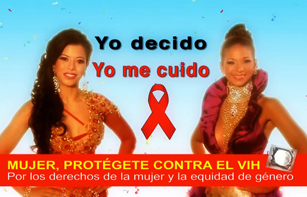
Feature Story
Carnival queens call on Panamanian young women to take the lead and protect themselves from HIV
18 February 2013
18 February 2013 18 February 2013
Image of one of the promotional images of the campaign featuring the Carnival queens.
Credit: UNAIDS
Last week was Carnival in Panama. As part of the celebrations during 11-12 February, the Queens of “Calle Arriba” and “Calle Abajo” —representing opposite neighbourhoods— competed against each other in a variety of contests. However when it comes to HIV, the two rivals joined forces to prevent new HIV infections among women.
UNAIDS, in partnership with the Panamanian Carnival Boards of “Calle Arriba” and “Calle Abajo”—the national institutions in charge of planning and coordinating activities related to this festivity— the National AIDS Programme, and PROBIDSIDA, launched a national campaign entitled “I decide, I take care of myself” (Yo decido, yo me cuido).
The campaign, which will run until the end of February, aims to help reduce gender inequalities, empower women and promote sexual and reproductive rights. One of the major goals is to ensure women can make informed decisions in relation to their sexual health, especially when it comes to preventing HIV.
“If we want that no more women get infected with HIV in Panama we need to join efforts at all levels, including institutions, civil society organizations and international agencies. This is why we decided to endorse this initiative,” said Pilar De Amores, Legal Representative of “Calle Arriba” Carnival Board.
In the last decade the number of new HIV infections has been on the rise among young women in Panama. A national survey on sexual and reproductive health held in 2009 and 2010 found that only 9% of women use condoms as a preventive measure during sex. Gender inequality is a major driving force behind the lack of reproductive and sexual rights of women in the country.
Gender inequalities affect women’s power to insist on and negotiate safe sex practices like condom use, and thus protect themselves from HIV
Ricardo Garcia, UNAIDS Country Coordinator for Panama and Costa Rica
“Gender inequalities affect women´s power to insist on and negotiate safe sex practices like condom use, and thus protect themselves from HIV” explains Ricardo Garcia, UNAIDS Country Coordinator for Panama and Costa Rica. “We have created this campaign to increase the recognition of women as having sexual rights and capable of exercising them, in line with the UNAIDS action framework on women, girls, gender equity and HIV”.
The campaign includes television spots that are being broadcast on national networks as well as posters in schools, organizations and on the streets featuring the Carnival queens calling on Panamanian young women to take the lead and protect themselves from HIV. As part of the campaign, the Queens received special training on issues related to HIV prevention and gender inequalities, in order to participate in public events and media programmes promoting the campaign.
“Women need access to HIV information, education, and services to have control over our bodies and be able to negotiate the use of condoms with our partners,” said Maruquel Madeleine González Velásquez, Queen of “Calle Arriba”. “I feel extremely accomplished to be part of this project,” she added.



